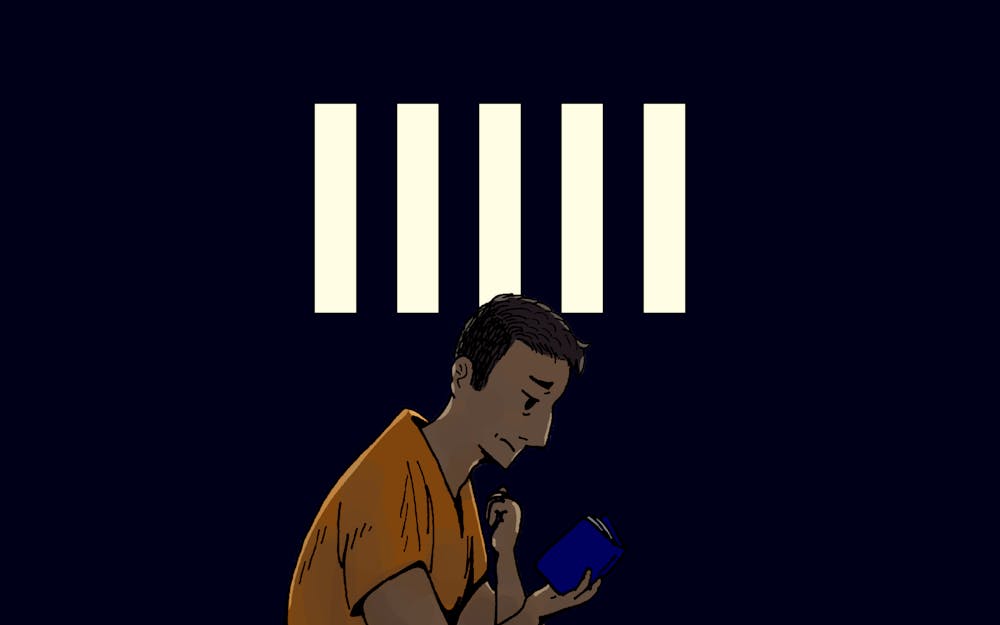The COVID-19 pandemic proves education in Indiana is a privilege and not equally accessible to everyone. Although school systems were able to develop ways to continue educating students during the pandemic, one form of education has seemingly been forgotten: education programs in jails.
Jail education contains multiple paths, from obtaining a GED to enrolling in college courses. Participating in education and training programs while incarcerated expands post-release economic opportunities significantly, according to a 2019 study by the Vera Institute of Justice. It found employment rates, number of hours worked and wages all increased as a result.
Prison and jail education has also proven to lead to lower rates of recidivism. A study conducted in 2010 by the American Correctional Association found that the rate of recidivism for incarcerated people in Indiana decreased 20% after obtaining a GED and 44% after obtaining a bachelor's degree while incarcerated.
Although obtaining a degree while in prison has unparalleled benefits, access to funding has diminished. Federal Pell Grants are the primary source of funding for college education programs in prisons, but the 1994 crime bill — an act which led to the proliferation of mass incarceration — severely limited their use.
In 1991, 14% of incarcerated individuals enrolled in college level courses, but by 2004, enrollment had fallen to 7%. The Vera Institute of Justice found 64% of incarcerated people are academically eligible for post-secondary education, but the federal program serves only a maximum of 12,000 students.
A lack of funding for education in prisons contributes directly to the cycle of poverty and potential recidivism, proving that education in prisons is more than simply knowledge gained from coursework.
Investing in education in jails is investing in the future of Indiana’s incarcerated citizens.
Although the Indiana Department of Correction has strictly limited in-person visitors to prevent the spread of COVID-19, prisons across Indiana are continuing education through virtual learning. IDOC has expanded the use of tablets and kiosks in Indiana prisons for educational, therapeutic and vocational uses.
However, not all jails offer online education.
The Monroe County jail has halted its education program due to the COVID-19 pandemic, Anthony Hibbert, a correctional officer at the Monroe County jail, said. The jail maintains strict restrictions on allowing the public into the jail.
iPads are offered to incarcerated people participating in the New Beginnings recovery program at the Monroe County jail. If resources are offered for the recovery program, why is the same not offered for educational programs? The lack of resources leaves incarcerated people to facilitate their own education through library resources offered by the jail, a blatant injustice.
Chris Rodal, a GED instructor at the Wayne County jail in eastern Indiana, taught classes in the morning and afternoon two days a week before the pandemic, but the education of incarcerated individuals was not deemed essential at the Wayne County jail when the COVID-19 pandemic began.
In-person instruction was prohibited and online instruction was not offered, Rodal said. Additionally, outside guests were not allowed in the Wayne County jail until August. In other words, the programs allowed by the jail — such as substance abuse counseling, AAA courses and GED education — were halted until August, where they’ve since stopped and started due to COVID-19 cases.
After starting again in August, Rodal was again out of commission after an incarcerated person tested positive in December. The jail then prohibited outside visitors from entering the jail until positive cases went back to zero.
Rodal said his passion for education makes him hopeful that he will return to the jail, but positive COVID-19 cases are not likely to end soon. One in eight people in Indiana prisons have tested positive for COVID-19.
If Indiana prisons do not learn to maintain the virus, it is clear that educational programs will not be reinstated.
Since the start of the pandemic, incarcerated people at Wayne County jail were often only allowed out of their cell one hour per day in order to prevent mixing and potentially spreading the virus, Rodal said.
“They did not get out of their block for anything except for class. Some people signed up for the class just to get out of the block,” Rodal said.
Now they are not on lockdown, but visitors are still not allowed to enter.
The treatment of incarcerated people in Indiana is inhumane. Going to class may be the only place where they are treated justly, and now they don’t even have that.
“This is more than an educational thing,” Rodal said. “I truly keep thinking that I can help make a positive impact on these people's lives.”
Isolated by the constraints of COVID-19 protocol, Indiana’s incarcerated individuals are receiving no education while living in inhumane conditions. Jails across Indiana must adapt their education methods to combat the unprecedented change of the COVID-19 pandemic.
People who are incarcerated deserve equal access to education.
Russ Hensley (he/him) is a sophomore studying mathematics, international law and institutions and Chinese. He is a member of IUSG on the Diversity, Equity and Inclusion Committee and a curator for TEDxIU. He aspires to work in gender and sexuality law.






